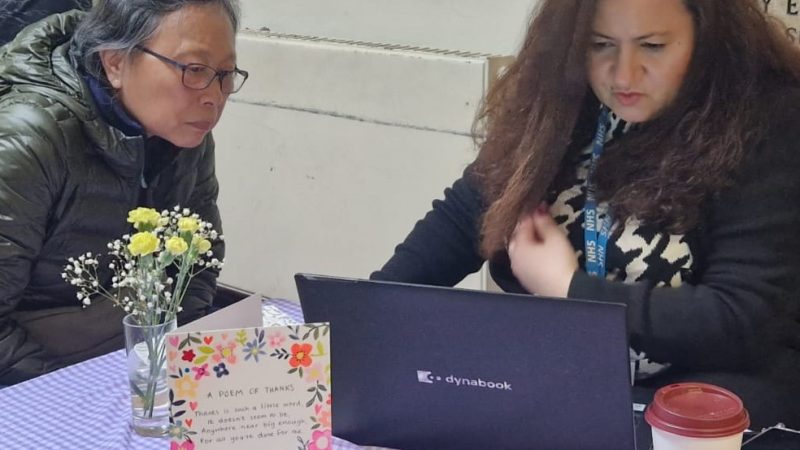This means you can be seen quicker and by the best person to help. It also means patients can access preventative care such as health and wellbeing support and medication reviews more easily, while reducing pressure on GPs. Not all roles are available at every practice, but you can always discuss the right person to see with reception staff.
Zerrin Buckle, Social Prescribing Network Lead

Zerrin explains: “People that visit their GP don’t always have issues that are strictly clinical and can be solved with a prescription. I can spend up to an hour with a patient to get to the bottom of what’s going on underneath any social or medical issues. That can be things like poor mental health, loneliness, problems around housing and welfare or family issues and even legal worries. My role makes sure that we can support GPs by signposting patients that have issues that I can better deal with to me, issues that are social and don’t necessarily need a doctor’s attention for diagnosis purposes, and it just works really, really well.
“I work as part of the primary care team so if I think someone would be better off seeing someone else at the practice, I can refer them on and they do the same with me. It isn’t exclusive, patients will see the right person and get the help they need.”
Sophie Wyness, Paramedic

Some local surgeries have a paramedic working in the team, meaning that more patients can be seen and benefit from their experience of helping with people with a variety of health issues, from minor injuries to more serious conditions.
Sophie explains: “I love the diversity of this role, working alongside the GPs at the practice. I see patients face to face, but also spend about fifty percent of my time going to see patients in their homes, which is something a GP can’t always do as easily.
“I share the on-call workload and take the pressure off the doctors at the practice, patients can be seen more quickly, and I can offer more options for them to be seen in person. I am also half-way through my independent prescribing qualification, which will further help to ease pressure and streamline the experience of the patients I see who end up needing medication.”
Katie Field, Care Coordinator Lead

Care Coordinators work with patients and other healthcare professionals to make sure they receive organised and effective care.
Katie explains: “As a care coordinator I review patients’ needs and establish their healthcare goals. I help them access services and any support they need so they can understand and manage their own health and wellbeing. Patients I see include those that are frail and elderly and with long term conditions. The role involves a significant amount of communication with patients, their family members and various healthcare professionals.
“Care coordinators are fully focused on their individual patients. This means I can spend more time with a patient than a GP can as the job is flexible, I have the opportunity to see the patient on their terms. I can do face to face or over the phone appointments, visit patients or see them in practices and offer consultations on the day or time they prefer. I enjoy my job as I can actually see the difference my work is having on the patients I am focusing on. I can provide empathy, love, care and understanding and feel I can really be there for them.”
Vitor Vaz, First Contact Physiotherapist

As a first contact physiotherapist at the surgery, Vitor sees patients with musculoskeletal conditions like back pain or sprains and can assess and offer solutions to manage those conditions.
Vitor explains: “I’m here to help with the assessment and management of musculoskeletal conditions. I can do referrals for specialists and request scans and further investigations if needed. However, my main role is to help patients make sure nothing dangerous is going on, and to help them get better.
“I see all kinds of patients, but mainly those with joint or lower back pain, neck pain, or people who have had a sprain or trauma. This role works really well because we provide a specialist assessment in primary care. Historically, patients would have needed a referral to a physiotherapist service which could take several weeks. Now they can immediately be seen by a specialist.”
Jaya Arora, Health and Wellbeing Coach

Health and Wellbeing Coaches guide and prompt people to change their behaviour, so that they can make healthcare choices based on what matters to them, using health coaching skills to support and motivate them.
Jaya explains: “My job isn’t necessarily just to do with clinical aspects, sometimes patients can be having a knock on effect on their health because of external factors like stress or their lifestyle. My role is to coach is to have a chat, figure out what’s stopping them from achieving their lifestyle goals, get them motivated, give them a little bit of a plan and help them organise, so that they can identity the triggers that are probably having an impact on their health going forward.
“People come to see their GP expecting to be given a plan and medication and coaching is very different. Patients shouldn’t be afraid of being referred to a coach, it’s not to divert them from seeing a doctor, it’s an add on. This helps keep patients focussed and give some help in the meantime because the wait lists for some services are very long. I’m there to be seen, ready to help you.”
Thaarani Srisenthivel, Clinical Pharmacist (Primary Care)

Clinical pharmacists work as part of the general practice team to treat patients directly, providing extra help to manage long-term conditions, offer advice for those on multiple medicines and give better access to health checks.
Thaarani explains: “My role includes carrying out medication reviews, supporting patients with long-term conditions and reviewing patients recently discharged from hospital. Reviewing patients’ medications makes sure that patients don’t take medications they no longer need and have less likelihood of getting side effects. This also helps the NHS save money.
“The NHS believes that prevention is better than cure and as pharmacists we truly are helping patients live a longer and healthier life by using preventative and early interventions. This means that fewer people will need access to emergency care. Having clinical pharmacists at a practice means they can be seen quicker and by the right clinician, enabling GPs to focus their skills where it is most needed.”
